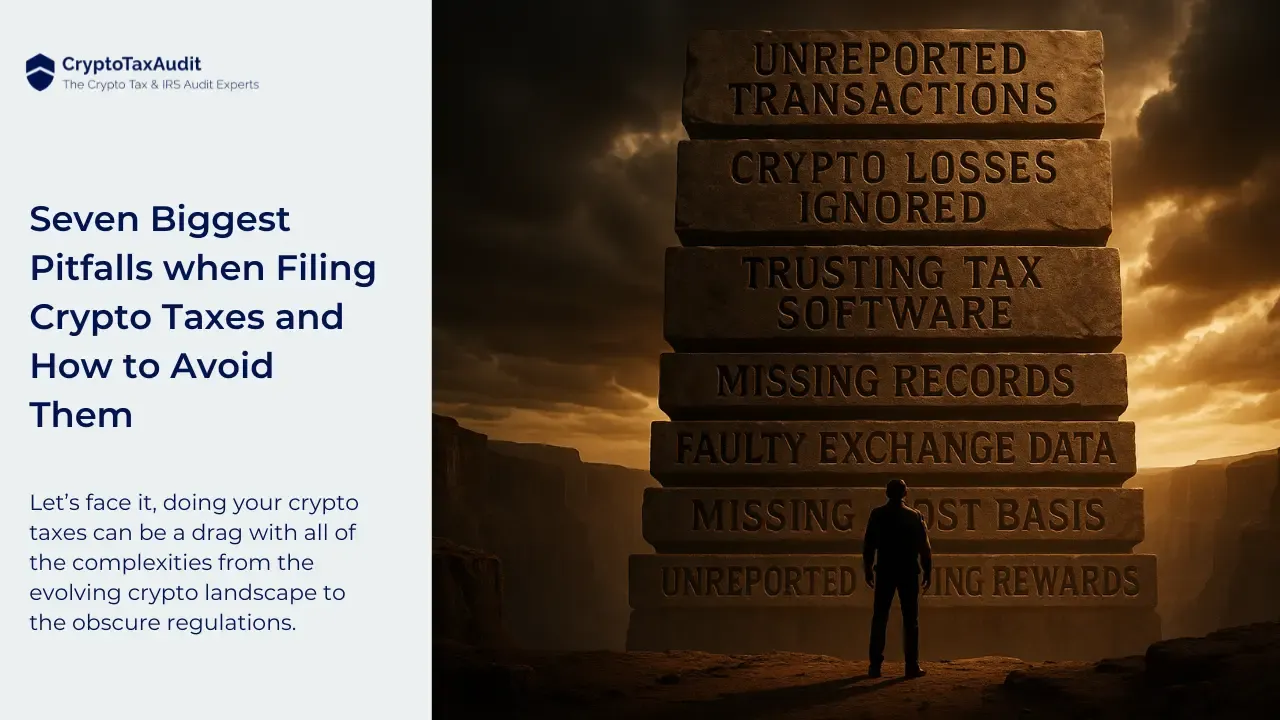
Crypto traders and investors need protection from the growing number of audits initiated by the IRS. Audit Defense is the answer.
Are you protected from the IRS?
The IRS is ramping up their audit machine to go after cryptocurrencies.
If you are a crypto trader or investor, you're at risk. And if you haven't protected your crypto assets with Audit Defense, here are just 3 reasons why you should.
The pandemic exposed many weaknesses in our financial system, creating a demand for innovative blockchain solutions. Before the pandemic, most people weren't keeping tabs on the economic factors that make crypto significant. And they probably didn't need to. But since then, governments worldwide have reduced the value of their currencies, including the United States' dollar, causing growing inflation by overprinting money.
Major companies like PayPal and Square are placing their bets on crypto and pushing it to the mainstream.
It's getting clearer that there's more interest in crypto now than ever before. Despite many economic, political, and social obstacles, the pandemic thrust digital innovation and the acceleration of a cashless society straight into the mainstream. This has significantly accelerated the adoption and interest in crypto worldwide, including interest by the IRS and the potential to rake in huge amounts of crypto taxes.
The IRS is cracking down on crypto traders.
The IRS, the money making arm of the U.S, is cracking down on, and tracking down, crypto traders.
While the government was weakening the dollar by printing $13 trillion to deal with the devastation of families struggling from strict pandemic lockdown measures, a new generation of investors starting building their crypto wallets at home.
Therefore, it’s no accident that the IRS has been tasked to track down crypto holdings to ensure they get their tax money. And, without clearer regulations and information to the average taxpayer, it's only getting more difficult for crypto investors to stay compliant -- or even understand what it means to be in compliance.
So, since crypto is the new target of the IRS, and is a glimmer of hope for the U.S. to recoup some of its unplanned emergency expenses, here are 3 reasons why you need to protect yourself with Audit Defense.
1. The IRS crypto question is now first.
The virtual currency question was renamed digital assets and was moved. It went from Schedule 1, a supplemental form, to the most prominent position on tax Form 1040, immediately following your name and address! That shows how serious the IRS has become about cryptos and other digital assets (like NFTs, play-to-earn tokens, and more).
Like many crypto traders we've talked to, you may not have reported your crypto in the past. Therefore, like those traders, you may be reluctant to say YES to the digital asset question. If you don't answer honestly, it could spell big trouble for you with the IRS.
That's why we created Audit Defense. The best defense, after all, is a good offense. That why we created Audit Defense. It's a membership program that monitors your IRS records and alerts you to a potential audit, reports on issues in your IRS account, represents you before the IRS, and defends you in the event of an IRS audit.
There aren't many crypto tax law firms that are willing or able to defend you in an IRS audit, especially with cryptos. Either they are afraid of the risks, don't understand it, or just don't want to get involved. If they do, they often charge $600 an hour or more for their services. That can really add up if you go to audit, appeals, and even tax court.
At CryptoTaxAudit, we have an ethical obligation to do honest reporting. We can also use additional tools like tax amnesty to help get you back into compliance. Helping you with installment payment plans, debt resolution, and audit defense are all part of our Audit Defense membership program.
2. You may not have submitted accurate tax returns.
The statute of limitations is generally three years from when you filed the tax return. If you had to file one of the anti-money laundering forms, which almost all crypto traders have to file, the statute of limitations for an audit is six years. That's especially true for active crypto traders with high transaction volumes.
That means that this year's tax return can be audited for up to six years in the future, and past returns can go back six years as well.
If you failed to report a significant amount of income, like forgetting to report your past crypto gains, the IRS can consider that as failure to report income. That's called tax evasion. When that happens, the IRS can choose to audit any year and you lose all statute of limitations protection entirely.
Likewise, if you never filed the anti-money laundering (AML) forms, your return also loses its statute of limitations protection. And most crypto taxpayers don't even know about this requirement.
Audit Defense protect you for whatever year the IRS may choose to audit. And, we don't even have to have filed your original tax return. Since there's really no time limit to how long they can come after you, defending yourself is an absolute no-brainer for any medium to large crypto owner. You may not be able to pay the crypto taxes due. Even if you want to get back into compliance and do what's right, you might not be able to afford it like many other crypto traders.
Probably the best investment you can make it to know where you stand. You need IRS account monitoring for audit flags and summary information, you need representation to set up a payment plan or make an offer-in-compromise, and you need defense if the IRS decides to audit you. And audit are expensive, time consuming, and difficult to defend on your own.
It can cost tens of thousands of dollars to defend yourself, and if you do it wrong, you could lose all your crypto wealth. And possibly, you could lose you your freedom as well. That's why we created Audit Defense.
Audit Defense membership is the best investment for your crypto assets if you are at risk with the IRS. And, simply put, it's the cost of doing business in the U.S., especially with the IRS on the prowl.
As citizens, we have an ethical obligation to do honest reporting and not lie. And like many, you could probably have done a lot better crypto reporting in the past. From now on, it's essential always to give your best effort when signing your crypto tax return.
Audit Defense helps you feel safe and sleep better knowing that the team at CryptoTaxAudit is there monitoring and protecting you.
Wishing you crypto success.
Like you, we want your crypto assets to go #ToTheMoon, and we'll be waiting for you when you get there. In the meantime, be sure to defend yourself with Audit Defense membership.
If you choose us to prepare your tax return, calculate your crypto gains, and provide you with IRS representation, know that we always aim for true, complete, and honest. And when you submit your tax return, we expect you to walk away with nothing less than a bulletproof crypto tax return with CryptoTaxAudit.
Remember, no cryptocurrency tax return is too complicated. We are the crypto tax and IRS audit experts. Learn more today.
DISCLAIMER: Opinions and perspectives of the author, host, and guests. It should not be construed as U.S. taxpayer advice. There are often multiple interpretations of tax law. Various strategies may be suited to specific individuals and for particular situations. Seek out professional tax, legal, or financial advice from CryptoTaxAudit or from other reputable companies.





